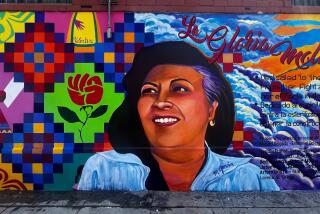THE SIMPSON LEGACY: LOS ANGELES TIMES SPECIAL REPORT : Twist of Fate / HOW THE CASE CHANGED THE LIVES OF THOSE IT TOUCHED : Spying Bronco Put Her in Spotlight
- Share via
SENSUNTEPEQUE, El Salvador — Without a cause or career to promote, Rosa Lopez epitomizes the reluctant overnight celebrity.
“I do not want an interview with anyone,” Lopez said before slamming the door of the modest concrete-block home she shares with her sister’s family in eastern El Salvador. “I am tired of reporters, of listening to them and having them write about me.”
Until she told a defense investigator that she saw O.J. Simpson’s Bronco in front of his house at the same time his former wife and her friend were being murdered more than a mile away, Lopez was another Salvadoran maid with a sad story.
She went to Los Angeles in 1969 to make money to support her children. Like thousands of other mothers, Lopez lost lost one of them--Rene Hilario Martinez, a military pilot--in her country’s 12-year civil war.
She suffered her tragedies in anonymity until, at age 56, she was swept up in the Simpson case. Seeing that Bronco made the maid who worked in the house next door to Simpson’s special, an important witness for the famed defendant and a media target. “Reporters follow me for blocks,” she said during a news conference in March.
Desperate to flee, she convinced the court to allow her to testify on videotape, out of the jury’s presence, months before the defense began its case. She was a bust. In halting testimony, she admitted to lying in some aspects of her testimony and said she could not remember other details.
That done, she immediately hopped a jet home to this town of cobblestone streets and tile-roofed houses, about 10 miles from the Honduran border. But scores of reporters were waiting for her at El Salvador’s only international airport. When Lopez eluded them, she found more camped on her sister’s doorstep.
On arrival, Lopez refused to talk with reporters until the mayor persuaded her that the best way to get rid of the media was to give a news conference.
She answered questions for 10 minutes and reporters left.
“She is a very private person,” said Father Oscar Heriberto Sanchez, the parish priest at the church half a block from her home. “The lady is right. Reporters have bothered her a lot. She has a right to privacy.”
Now, reporters call on Lopez only occasionally, receiving the same chilly reception as the first day.
The questions that seem to irritate Lopez the most refer to her source of income, questions that suggest she might have been paid for testimony that provided Simpson with an alibi.
She has said that she lives on a pension left by her late son. Another possible source of income is the small farm that Lopez owns about two miles outside town. She often goes out to the farm with a commanding view of a nearby valley to relax, a farm worker said.
“Her family has always been farmers,” said Luis Dolores Serrano, principal of the school where Lopez’s children studied and a former classmate of Lopez’s late son. “She is a person with a good reputation, an honorable woman.”
Lopez stayed inside at first but now travels often to visit friends and relatives in the town and on the outskirts of the capital, San Salvador, about 50 miles away.
“She comes and goes,” said a niece. “She feels a lot better now. There is no reason for her to return to the United States.”
Her priest agreed. He said Lopez attends Mass every Sunday and helps with carnivals to raise money for the church. “She seems calmer now. She is a woman of strong principles.”
More to Read
Sign up for Essential California
The most important California stories and recommendations in your inbox every morning.
You may occasionally receive promotional content from the Los Angeles Times.










